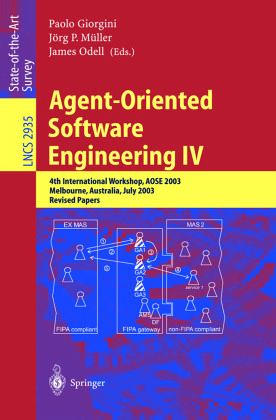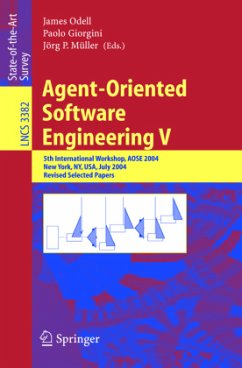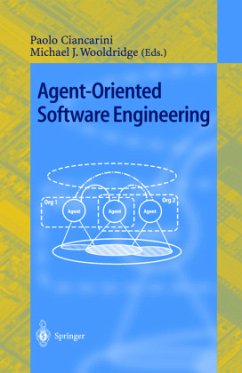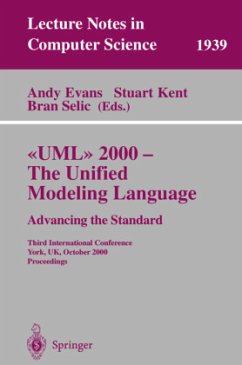
Agent-Oriented Software Engineering IV
4th International Workshop, AOSE 2003, Melbourne, Australia, July 15, 2003, Revised Papers
Herausgegeben: Giorgini, Paolo; Müller, Jörg P.; Odell, James

PAYBACK Punkte
20 °P sammeln!
This book assesses the state of the art of agent-based approaches as a software engineering paradigm. The 15 revised full papers presented together with an invited article were carefully selected from 43 submissions during two rounds of reviewing and improvement for the 4th International Workshop on Agent-Oriented Software Engineering, AOSE 2003, held in Melbourne, Australia, in July during AAMAS 2003.
The papers address all current issues in the field of software agents and multi-agent systems relevant for software engineering; they are organized in topical sections on
- modeling agents and multi-agent systems
- methodologies and tools
- patterns, architectures, and reuse
- roles and organizations.
The papers address all current issues in the field of software agents and multi-agent systems relevant for software engineering; they are organized in topical sections on
- modeling agents and multi-agent systems
- methodologies and tools
- patterns, architectures, and reuse
- roles and organizations.
The explosive growth of application areas such as electronic commerce, ent- prise resource planning and mobile computing has profoundly and irreversibly changed our views on software systems. Nowadays, software is to be based on open architectures that continuously change and evolve to accommodate new components and meet new requirements. Software must also operate on di- rent platforms, without recompilation, and with minimal assumptions about its operating environment and its users. Furthermore, software must be robust and autonomous, capable of serving a naive user with a minimum of overhead and interference. Agent concepts hold great promise for responding to the new realities of so- ware systems. They o?er higher-level abstractions and mechanisms that address issues such as knowledge representation and reasoning, communication, coor- nation, cooperation among heterogeneous and autonomous parties, perception, commitments, goals, beliefs, and intentions, all of which need conceptual mo- ling. On the one hand, the concrete implementation of these concepts can lead to advanced functionalities, e.g., in inference-based query answering, transaction control, adaptive work?ows, brokering and integration of disparate information sources, and automated communication processes. On the other hand, their rich representational capabilities allow more faithful and ?exible treatments of c- plex organizational processes, leading to more e?ective requirements analysis and architectural/detailed design.














